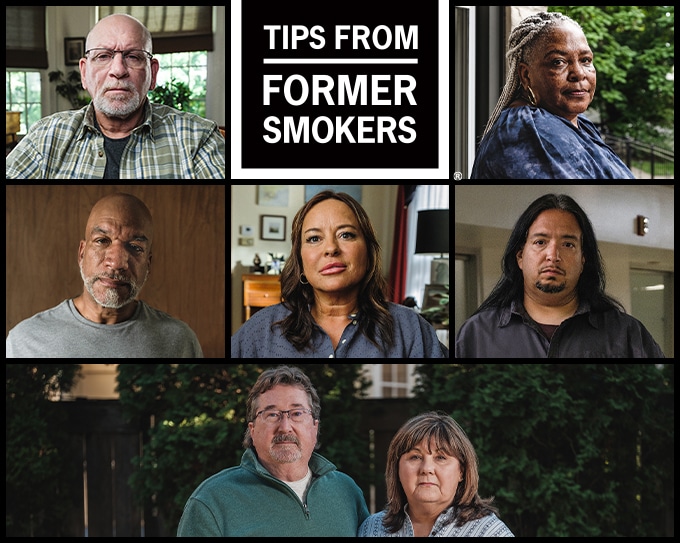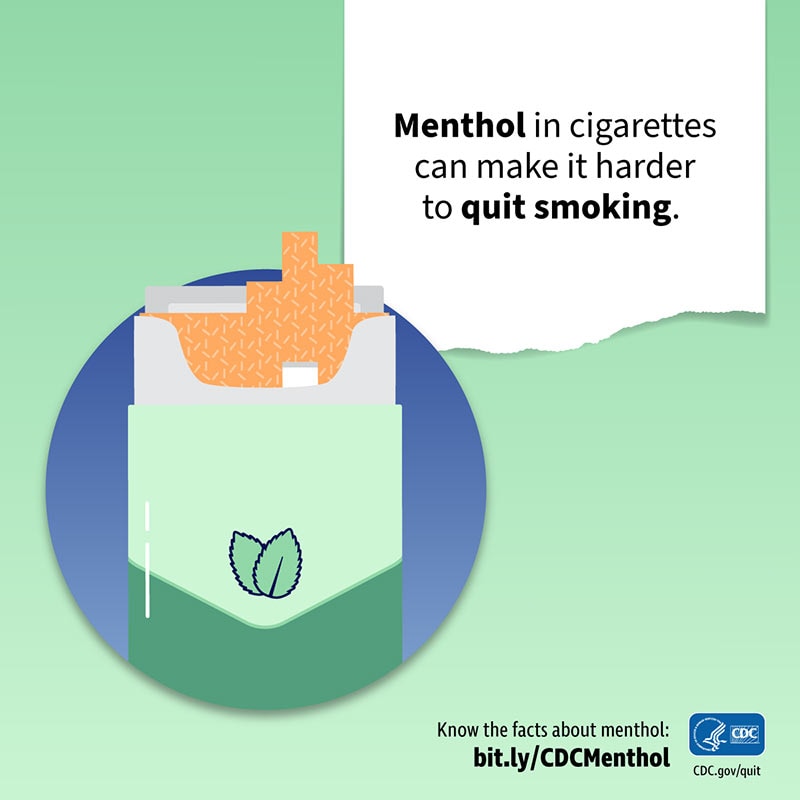2024 Tips From Former Smokers Campaign Launch
People Featured in the 2024 Tips From Former Smokers® Campaign Share Experiences with Menthol Cigarettes, Health Harms, and Quitting Journeys
Angie P. started smoking menthol cigarettes at age 15. She explains in a new Tips From Former Smokers® (Tips®) TV ad that as a gay teen, trying to figure out who she was, she hid behind smoking. She continued to smoke for another 25 years, and this affected her career as a singer. Over time, she also became aware of tobacco companies’ aggressive marketing of cigarettes, including menthols.
“My hope is to help other people, especially LGBTQ+ people, understand what the tobacco companies are trying to do with their advertising. I’d tell them it’s not worth it to smoke,” Angie said. “Their lives and their health are worth more.”
Starting February 5, Angie and six other people will share their quit-smoking stories in the Tips campaign. The campaign will air new ads to inspire people who smoke to quit and promote free resources to help them if they need it.
Angie P.: Love Yourself Tip

The Tips campaign features more than 45 real people impacted by the serious long-term health effects from smoking and secondhand smoke exposure. Tips also shares stories from loved ones. They describe how taking care of someone living with a smoking-related condition has affected their own lives and health.
The new people featured in the Tips campaign include:
- Angie P. smoked to fit in when she felt that people close to her would not accept her because she is gay. She wants to encourage other LGBTQ+ people who smoke to love themselves and get the help they need to quit.
- Elizabeth B. started smoking menthol cigarettes at age 18. Years later, she had trouble walking because of smoking-related peripheral artery disease (PAD). She later developed kidney cancer. Her husband Stephen helps take care of her.
- Ethan B. grew up seeing ads that made him think smoking menthol cigarettes was “cool.” As an adult, he had two smoking-related strokes which affected his memory.
- John B. tried many strategies to try to quit smoking, but nothing seemed to work. He kept trying and finally succeeded when, with the help of his doctor, he found the methods that worked best for him. Those methods were counseling and using two FDA-approved quit-smoking medicines.
- Noel S. smoked two packs a day for more than 20 years. He suffered a smoking-related heart attack at 36 years old. Noel quit smoking menthol cigarettes so he could be around to watch younger family members grow up.
- Tammy W. thought that menthol cigarettes were less harmful than non-menthol cigarettes. She also thought she would avoid health harms if she continued eating healthy foods, exercising at the gym, and running every day. Tammy realized menthol cigarettes are just as dangerous as regular cigarettes when she discovered she had severe heart disease and had to have emergency open-heart surgery.

Several of the new ads focus on menthol cigarettes. Menthol is an ingredient added to many tobacco products. It creates a cooling sensation in the throat and airways, which makes smoking feel less harsh. Menthol in cigarettes can make them more appealing to young people and people who have never used tobacco products. Menthol also enhances the effects of nicotine on the brain and can make tobacco products even more addictive. Menthol in cigarettes can make it more difficult to quit smoking.
In 2021, menthol cigarette sales made up 37% of all U.S. cigarette sales. Menthol cigarettes contribute to tobacco-related health disparities in the United States.
Over the years, tobacco companies have used tailored advertising to market to many communities, including:
- African American Adults: In the 1950s, less than 10% of African American adults who smoked used menthol cigarettes. That percentage has risen to 85%, compared to 39% of the general population that smokes. The tobacco industry has used several tactics to market menthol cigarettes to African American communities. For example, tobacco companies have placed ads in Black-owned publications and in neighborhoods with more Black residents.
- LGBTQ+ Communities: The tobacco industry has targeted the LGBTQ+ community for decades. Tobacco companies have sponsored events and offered bar promotions, giveaways, and advertisements that target LGBTQ+ people. More than 36% of LGBTQ+ adults who smoke use menthol cigarettes.
- Women: Tobacco companies designed menthol cigarette packaging and ads in ways that appeal to women. Women who smoke are more likely to use menthol cigarettes than men who smoke.
- Youth and Young Adults: Tobacco companies have targeted marketing to youth through advertisements, in-store signage, and sponsorships of community music events. Flavored tobacco products, including menthol flavors, appeal to youth. Menthol in cigarettes makes it more likely that youth and young adults will try smoking. Menthol in cigarettes also makes it more likely that youth who start smoking menthols will continue to smoke on a regular basis.
Quitting smoking is the single best way you can protect yourself and your family members, coworkers, friends, and others from the health risks of smoking and secondhand smoke exposure. The people featured in the Tips campaign can inspire you and help you on your quitting journey!
The Tips website has free resources to help you quit and keep you motivated. Below are several free resources to help you in your quit journey. Quitting smoking can be hard, but it is possible! Keep trying until you find quitting supports that work best for you.
Join the millions of Americans the Tips campaign has inspired to quit smoking. Make 2024 the year you quit for good!